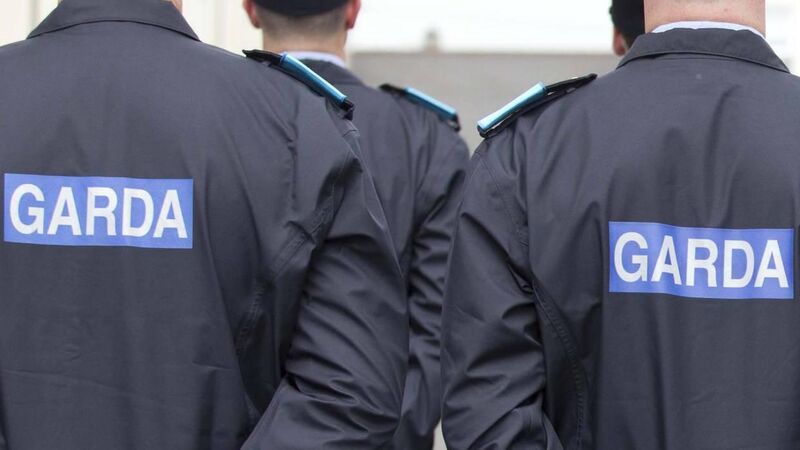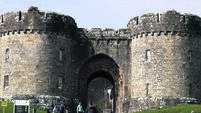A society is supposed to lock up criminals - not its gardaí!

We have to treat our guards better, and put more on the streets, says Áilín Quinlan
The driver slowed, and pulled in so we could all have a good look. It was a uniformed garda. A real, live, uniformed garda in a helmet and a hi-vis vest! On a real Garda motorbike! On a street! Just sitting there, straddling the bike!
Not behind the windshield of a patrol car, or shackled to a screen in the local garda station waiting for permission from Control to put a toe outside the barracks door.
“What on earth?” we gasped. The garda nodded to us, coldly, firmly, just like a real garda would, in the old days.
One of our back seat passengers was a local. He peered out. “Ah no, he’s only there because of the court. They always have a guard around on court days.”
Oh, we said, disappointed. Still, for a second there, it was exciting, given that these days you’d as soon see a pelican on the street as a police officer.
Europe, as we know, is on fire, overwhelmed by a series of heatwaves. Wildfires are raging in the Swiss Alps and there is panic in Greece, where temperatures hit 40 degrees Celsius.
Classic European tourist spots have turned into ghost towns and areas of France have been put on heat alert. Sardinia was facing 46 degrees at one point during the week.
In Spain, where temperatures have also reached 40 degrees Celsius, a tourist described the heat as “relentless,” “very aggressive”, “horrendous” and reported that he was constantly dripping with sweat.
Because planeloads of Spaniards, Italians, French, Germans, etc, will start flocking to Ireland as our climate is so mild in comparison to theirs. Even though June went on record as the hottest ever in Ireland, the average temperature was still just over 16 degrees Celsius (although, it must be said, the highest temperature of the month and the year was in Carlow in mid-June when the thermometer hit just under 29 degrees).
July usually averages between 12-19 degrees Celsius, so if you’re being sauteed alive in Sardinia or frying in France, wouldn’t you just love to come walking and hiking and swimming in Ireland under our mild, cloudy, rainy skies?
But. You might be intimidated by all the nocturnal anti-social behaviour on the streets, because we keep our gardaí locked indoors until a whistle is blown somewhere up the country to allow them out.
We don’t pay them properly, treat them with the respect they deserve, or give them sufficient resources to do their job.
A resident of a picturesque West Cork town said to me only the other day that things were fine there “as long as you don’t go out at night”. Phew! Great recommendation for what is a top Cork tourism destination – and from a local.
But it’s not just Cork, obviously. Policing, as in the traditional format of policing anti-social behaviour on the streets or, indeed, as we now increasingly need it, on public transport, is today virtually non-existent.
Thing is, though, the nice people who are prepared to come and pay to stay in Killarney and Galway and Cork and Westport and Limerick and all the other lovely places in this country do not want to feel intimidated when they walk down the street of a city or, indeed, a rural town, after 8pm.
They will expect to see gardaí out on patrol, keeping an eye on the Hooray Henrys and Henriettas, and they will expect to see a tough stance taken on anti-social behaviour, and they will expect the gardaí to control the droves of aggressive and abusive boy racers and their WAGs who crawl out from their hidey-holes to flock to the beaches and cause mayhem the minute the sun comes out.
Foreigners will want to feel safe when travelling on our trains and buses. They will not want to see their fellow passengers openly inhaling cocaine, drinking, fighting or abusing staff or other passengers. They will not approve of the sight of drunks urinating on outdoor ATM machines, which they expect to be able to safely and hygienically use, and they will be put off by the drink cans and fast-food litter and other rubbish blowing around our country roads and beaches.
Currently, a high-level industry insider in a prominent hotel chain in the Munster area, told me that foreign visitors are being put off by the absolutely crazy prices being charged in Dublin hotels. They think every hotel is charging these prices, he complained.
“Except it’s not just Dublin,” I told him. I explained how my uncle, a widower in his late seventies, has been going to the same hotel in a scenic Co Galway town for the past 50 years. This summer he had planned to go for a few nights as usual to the hotel – until he was quoted €289 for bed, breakfast and a dinner just for himself for the Saturday night, and €279 for the same on the Sunday.
On top of that, he was told, there would be a 12.5% service charge.
Ah, now, lads. Get real. Ireland’s tourism industry is about to turn into a goose that lays golden eggs – unless of course we shoot it dead by continuing to enable intimidating anti-social behaviour on our streets and public transport, through this crazy ‘lock-up-the-gardaí-and-pay-them-peanuts’ policing model, charging tourists astronomical prices for hotel stays, and covering our beaches and our countryside with litter.
It’s up to us, guys.







 App?
App?




